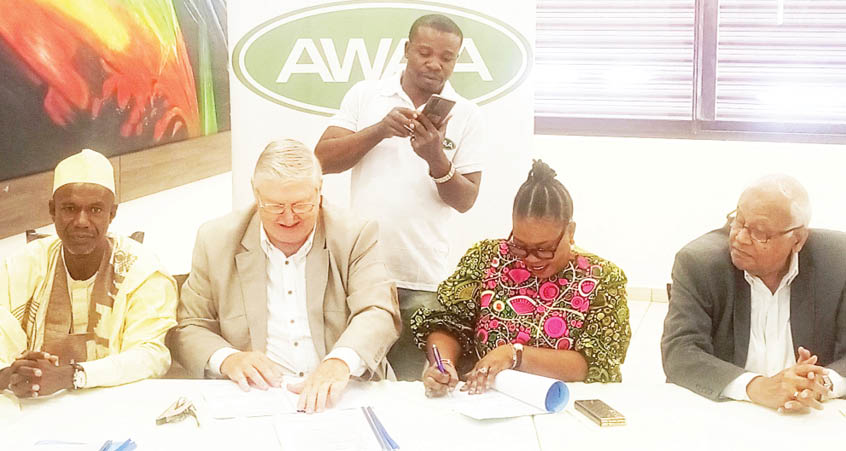The National Association of Cattle Dealers, Processors and Marketers of Nigeria (NACDPAMN) has signed a Memoranda of Understanding (MoU) with Comprehensive Agric Ltd and Jil Farms & Equipment Ltd to enhance the livestock value chain in the country.
The deal is facilitated by the Greenlands Integrated Agribusiness Group and is expected to attract about N11 billion in funding from partner financial institutions, the Central Bank of Nigeria and the Sun Trust Bank.
Zulum inaugurates 2.17-kilometre township road, 30-bed PHC
How Bauchi woman, 52, died protecting son from bandits
Comprehensive Agric Ltd and Jil Farms & Equipment Ltd, which are managed by the American West African Agro Ltd (AWAA) have key investments in the livestock production and value chain products.
Speaking at the event Wednesday in Abuja, the Managing Director of American West African Agro, Ltd (AWAA), Jerry Cunningham, who has extensive experience in the implementation of major projects in agriculture, irrigation, and processing systems, said Nigerian livestock potential is “amazing and tremendous.”
He however said Nigeria is about 50 per cent short on the supply of protein or meat, adding that the country has the numbers of cattle but the animals do not have the required weight and “the only way to do that is through the feedlots.”
The Managing Director said the farm currently has capacity for 10,000 cows in Kogi and is only slaughtering 100 cows a day, which is just a tiny fraction of the 18,000 cows consumed a day in Nigeria.
He therefore stressed that there was need for multiple feedlots in every state to conquer the problem of malnourished cows.
“I’m from Nebraska USA; we’re very familiar with feeding cattle. So, when I came to Nigeria, I said we’ve got to do this. The herdsmen-farmer conflict will stop if it’s done correctly. We started this in Kogi a couple years ago. We built our feedlots; we’re using the herdsmen, we buy cattle from them,” said Cunningham.
He said when the programme is fully developed, it would add N500 billion to the industry.
NACDPAMN president, Alhaji Illiyasu Bulama, said the arrangement will see the association deliver 7,000 cows weekly to the group for fattening.
“We are looking at a situation where a farmer would have three cows each and we are looking at about 7,000 farmers. If you calculate that, it would give you about 21,000 cows and this will be in every three months. We have the capacity to supply them with that number and we still have more ground,” Bulama said.
The Regional Executive in charge of Abuja/North and the Head Agribusiness Banking of the Sun Trust Bank, Ms Detoun Abbi-Olaniyan, said the bank will do everything necessary to make the arrangement succeed.
Although the bank did not put a figure to its commitment, she said the value chain potentials from the programme will attract billions of naira and dollars to the country.
The Group Managing Director and Chief Executive Officer of the GreenLands Integrated Agribusiness Group that facilitated the MoU, Mr. Ayobami Aremu, said for many years the Nigeria’s livestock sector has been in the dark when it comes to cattle business.
Mr. Aremu said the urge to invest in the sector comes from his many years’ experience in the UK having seen these done in the right manner, he decided to return home to chart the way forward.
He said his company aggregated all the problems and challenges and then approached AWAA, managed by Jerry Cunningham who was already setting up in Kogi and was willing to invest in the backward integration with the cattle herders and a further investment in the processing plant.
“We approached the CBN and currently as we are talking, we are processing financial facility of about N11bn for the project, it is in the advance stage. The feedlots have been set up in Kogi and Niger states. Cattle herders are already supplying cattle to him. They are going to be doing a thousand a week and gradually move to 40,000 every week in the future. The first 5000 herds have gone to the processing plant in Ekpe, Lagos and Niger State,” Mr. Aremu said.
The new arrangement will see more herders adopt modern approach to cattle production and will solve the lingering problem of clashes and killings in the sector.

 Join Daily Trust WhatsApp Community For Quick Access To News and Happenings Around You.
Join Daily Trust WhatsApp Community For Quick Access To News and Happenings Around You.


